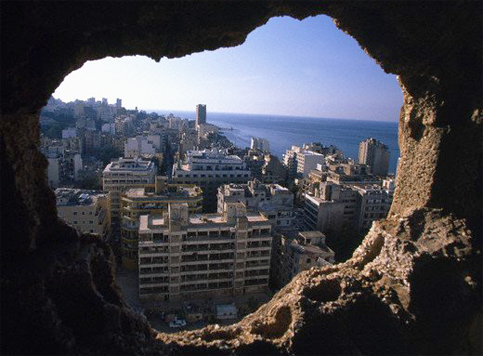by Simona Sikimic & Wassim Mroueh Daily Star Tuesday, November 16, 2010.

- Photo Beirut skyline view from civil war destroyed building.
People across the country prepared for three days of relative calm as they planned to gather with family and friends Tuesday to celebrate Eid al-Adha.
The break is viewed by many as much-needed reprieve from the heated political rhetoric that has raged over the impending indictment from the UN-backed Special Tribunal for Lebanon (STL) and engulfed Lebanon in a spiral of mistrustful bickering, threatening to reignite sectarian strife.
But inhibiting factors have already worked to put a damper on festivities.
Countless people have voiced concerns that despite trying to be creative with their money, rising consumer prices have left them unable to meet normal holiday obligations.
While certain “necessities” have not been compromised on – fuel-price hikes have not stopped tens of thousands of people fleeing the cities Monday and leaving the already busy motorways in a state of utter gridlock – the political uncertainty has had a knock-on effect on consumer confidence.
People have been less willing to splash out on holiday gifts with retailers, already hard-hit by the global economic downturn, noting a significant drop in year-on-year sales.
“I have only one demand, to shut down all television stations and newspapers in the country so that people can work [peacefully] and separate between politics and religion,” said Adib Fadel, a shoe store owner in Mar Elias.
“My sales are acceptable but they are far less than in other years.”
Fellow shop owner Salah Saadeddine, who runs a sweet store in Barbour Street, similarly blames the current economic stagnation and political stalemate for his dwindling turnout. “The turnout is good but not nearly as good as previous years, with demand focusing on two types of sweets that are usually picked up in similar occasions,” he said. “I don’t rely on Lebanese officials [to improve] the situation because I believe they are helpless, let them all be thrown into garbage.”
Even on the eve of the big Muslim celebration, shops remained unseasonably empty as people blame their shrinking purchasing ability on the flailing domestic labor market.
The price of certain food stuffs, such as meat and vegetables, have soared to near-record highs in recent months, with the price of certain goods, such a tomatoes, rising by 100 percent and 400 percent on some varieties, according to Agriculture Ministry figures.
Despite Agriculture Minister Hussein Hajj Hassan’s predictions in October that prices would begin to normalize by late November, retailers claim they have yet to notice an easing related to global supply-and-demand-related factors and say that insufficient action has been taken to crackdown on wholesalers.
Mohammad Khodr, owner of a Mazraa butchers, blamed meat wholesalers for the low holiday demand.
“Wholesalers have reduced the price of meat by LL1,000 only, which is not enough, the price cut should range between LL3,000 to LL4,000,” he said while urging the government to act on large suppliers. “In similar days before, my shop used to be crammed with clients,” he complained.
The price of non-food items, such as toys, shoes and clothes, are additionally thought to have risen since last year, despite a significant fall in inflation from 10.8 percent in 2009 to 3.4 percent in 2010.
Some shoppers claimed to have noticed as much as a 30 percent increase on items considered as “non-essentials” such as shoes or minor fashion brands.
“Things are very difficult this year and many people are not managing to buy the things they would like,” said shopper Noura Khalaf. “If you have four children there is no way you will be able to buy each one of them a present.
“I wanted to buy jeans for my daughter but they are LL40,000. She is a child she will grow out of them quickly, how is anyone expected to keep up with these constant increases and pressure?
“More people need jobs, there are not enough out there and those that have them cannot be sure that they will keep them. I used to work but I don’t anymore, I worry things will get worse, not better.”
Eid al-Adha, also known as the “Festival of Sacrifice” is a holiday associated with generosity, with people traditionally expected to sacrifice a ram and distribute one-third to the needy, one to family and friends and retain the last.


